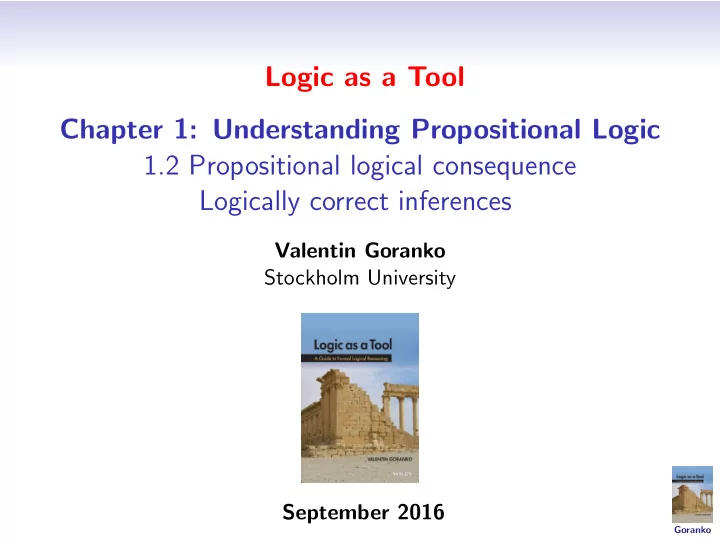

Logic as a Tool Chapter 1: Understanding Propositional Logic 1.2 Propositional logical consequence Logically correct inferences Valentin Goranko Stockholm University September 2016 Goranko
Propositional logical consequence A propositional formula C is a logical consequence from the propositional formulae A 1 , . . . , A n , denoted A 1 , . . . , A n | = C , if C is true whenever all A 1 , . . . , A n are true, i.e., every assignment of truth-values to the variables occurring in A 1 , . . . , A n , C which renders the formulae A 1 , . . . , A n true, renders the formula C true, too. If A 1 , . . . , A n | = C , we also say that C follows logically from A 1 , . . . , A n , and that A 1 , . . . , A n logically imply C . Logical consequence is reducible to validity: A 1 , . . . , A n | = C iff A 1 ∧ . . . ∧ A n | = C iff | = ( A 1 ∧ . . . ∧ A n ) → C . Goranko
Propositional logical consequence is reducible to validity Proposition For any propositional formulae A 1 , . . . , A n , B, the following are equivalent: 1. A 1 , . . . , A n | = B 2. A 1 ∧ . . . ∧ A n | = B 3. | = ( A 1 ∧ . . . ∧ A n ) → B 4. | = A 1 → ( . . . → ( A n → B ) . . . ) Goranko
Testing propositional consequence with truth tables Example 1 ? p , p → q | = q p q p p → q q T T T T T T F T F F F T F T T F F F T F Yes. Goranko
Testing propositional consequence with truth tables Example 2 ? p → q | = q → p p → q q → p p q T T T T T F F T F F T T F F ... ... No. Goranko
Testing propositional consequence with truth tables Example 3 ? p → r , q → r | = ( p ∨ q ) → r p q r p → r q → r p ∨ q ( p ∨ q ) → r T T T T T T T T T F F F T F T F T T T T T T F F F T T F F T T T T T T F T F T F T F F F T T T F T F F F T T F T Yes. Goranko
Sound rules of propositional inference A rule of propositional inference (for short, inference rule) is a scheme: P 1 , . . . , P n , C where P 1 , . . . , P n , C are propositional formulae. The formulae P 1 , . . . , P n are called premises of the inference rule, and C is its conclusion. An inference rule is (logically) sound if its conclusion logically follows from the premises. A propositional inference is an instance of a rule, where propositions are uniformly replaced by the propositional variables. A propositional inference is (logically) correct if it is an instance of a sound inference rule. Goranko
Propositional inference: example 1 Consider the propositional inference: Alexis is singing. If Alexis is singing, then Alexis is happy. Alexis is happy. It is obtained from the following rule, called Modus Ponens: p , p → q q This rule is sound, therefore, the inference is logically correct. Goranko
Propositional inference: example 2 Now consider the propositional inference: 2 plus 2 equals 4. If 5 is greater than 3, then 2 plus 2 equals 4. 5 is greater than 3. It is based on the rule p , q → p q which is not sound. Therefore, the inference is not logically correct. Goranko
Recommend
More recommend